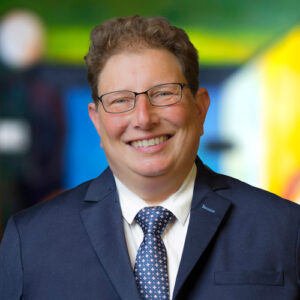
ACBA member Rebecca Peterson-Fisher is a Partner at Katz Banks Kumin, where she focuses on litigation that advances social justice, including employment discrimination, wage theft, and harassment cases. She has represented a wide range of clients—from corporate executives to fast food workers—and secured seven-figure settlements as well as meaningful policy reforms. Before joining the firm in 2023, she was a Partner at Liu Peterson-Fisher LLP, a Bay Area employment and civil rights law firm. Her prior roles include senior staff attorney at Equal Rights Advocates and attorney positions at Traber & Voorhees in Los Angeles and Legal Services of New York. Recognized among the Top 75 Labor and Employment Lawyers in California by the Daily Journal (2022–2023) and a Northern California Super Lawyer (2020–2024), she also serves on several bar association committees and the California Employment Lawyers Association’s Legislative Committee. Ms. Peterson-Fisher earned her JD from NYU School of Law and clerked for U.S. Magistrate Judge Michael H. Dolinger in the Southern District of New York. She is a frequent speaker at MCLE programs and serves on the ACBA’s Appellate Section and Labor and Employment Law Section‘s executive committees.
When did you know you wanted to be a lawyer?
After college, I had two jobs that confirmed to me that I wanted a career where I could have a concrete impact. First, I completed a two-year AmeriCorps program working at a bilingual elementary school in East Oakland. I worked at the school site but for an organization called Partners in School Innovation. The work was focused on literacy, racial equity, and democratic decision-making in schools. I saw in that job that school reform is a slow process, and years of work can be undone by new legal mandates and funding cuts. I also saw how kids’ ability to learn was impacted by poverty and by how our legal systems interacted with their parents. Then I worked for the Center for AIDS Prevention Studies at UCSF on a research project focused on transgender sex workers housed in a resource center adjacent to the Tenderloin. These women were profoundly impacted by discrimination that limited their opportunities in life. And so was I, as a queer and gender non-conforming person treated as a second-class citizen, though to a less extreme degree than some of the women I worked with. Around this time I was also involved in various protests and I remember being really inspired by a training that National Lawyers Guild volunteers gave to make sure everyone knew their legal rights in case they were arrested. In the end, I thought it would be empowering to become a lawyer and it would give me an opportunity to really get some wins for people and communities. And it has been both of those things.
If you hadn’t become a lawyer, what would you be doing instead?
If I had thrown all practical considerations to the winds, I would be a musician.
What do you know now that you wish you had known when you were first admitted to practice?
Find a mentor who can help you prioritize. It’s really hard to juggle a lot of case all at once and it’s much harder when you don’t have a lot of experience and you haven’t developed the judgment that can help you decide what to focus on first. It can feel like everything has to get done right now, and that can be overwhelming. This is part of managing stress, which is a challenge in our profession generally.
What is the biggest challenge facing you as a lawyer today?
Without question it is the erosion of the rule of law in this country. I hope we can reverse it.
What is your favorite part of being a lawyer?
Knowing at the end of the day that I really helped someone.
What is your dream vacation?
I would love to go to Tahiti and stay in those bungalows over the water with glass floors so you can see the fish.
What are you reading now?
I’m reading the works of Ethel Lina White. I learned about her from the New York Times’ “Overlooked” series, which is about extraordinary people who the New York Times did not publish an obituary for. She is a remarkable suspense writer, and Alfred Hitchcock adapted some of her novels into films.
What’s one thing people might be surprised to learn about you?
I‘m a huge fan of the private investigator genre, especially ones with female leads.
What person, living or dead, real or fictional, would you like to have dinner with?
Harvey Milk. I’d be really interested in his take on everything that is happening today, and on how the LGBTQ+ rights struggle has played out over the years.
Why do you choose to be a member of the ACBA? What is the greatest benefit you have enjoyed as a member?
I moved to the Bay Area from LA and I wanted to establish myself more and make connections in this community. I’ve met great people through the ACBA and I really appreciate this organization’s leadership and values. ACBA put on some amazing programming with the Charles Houston Bar Association in the wake of the murder of George Floyd that I really appreciated. And as member of two executive committees, I’ve had the opportunity to create the MCLEs that I want to attend and bring people together to learn from them.
Follow Rebecca Peterson-Fisher’s example and become a member of the ACBA today! Find more information on our Why Join page.
